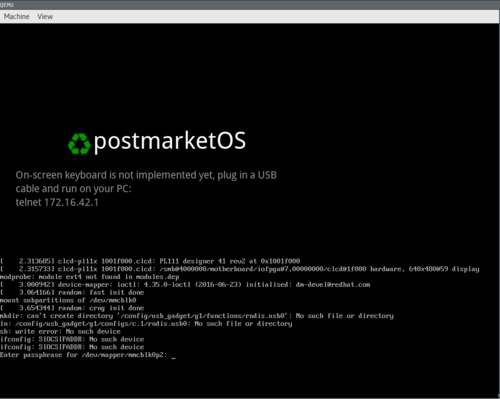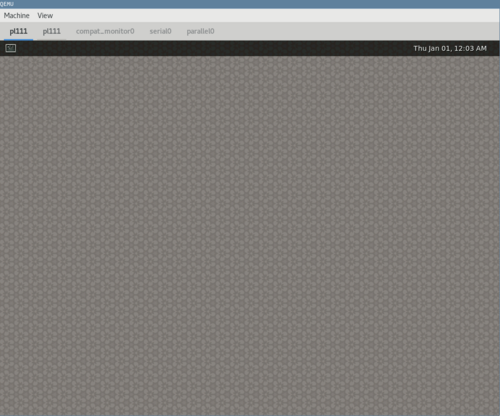QEMU ARM (qemu-vexpress): Difference between revisions
Appearance
mNo edit summary |
add usage notes, update the article in general |
||
| Line 1: | Line 1: | ||
[[ | {{note|CPU emulation is slow! Consider using [[Qemu-amd64-(QEMU-for-x86_64)|qemu-amd64]] instead if <code>x86_64</code> is your native architecture.}} | ||
This device is used to emulate an ARM Versatile Express for Cortex-A9. Vexpress (Versatile Express) is the reference architecture from the ARM Foundation. It simulates the armv7 architecture and a lot of other hardware (like graphics hardware). QEMU supports many other ARM architectures (see <code>qemu-system-arm -machine help</code>). | |||
This device is used to emulate an ARM Versatile Express for Cortex-A9. | |||
Vexpress (Versatile Express) is the reference architecture from the ARM Foundation. It simulates the armv7 architecture and a lot of other hardware (like graphics hardware). | |||
QEMU supports many other ARM architectures (see <code>qemu-system-arm -machine help</code>) | |||
=== Contributors === | === Contributors === | ||
* MartijnBraam | * MartijnBraam | ||
* mmaret | * mmaret | ||
=== Usage === | |||
<syntaxhighlight lang="shell-session"> | |||
$ pmbootstrap init # Choose device "qemu-vexpress" | |||
$ pmbootstrap install --no-fde | |||
$ pmbootstrap qemu --image-size=2G --display=gtk | |||
</syntaxhighlight> | |||
Using the <code>--display=gtk</code> parameter is recommended. The default display, SDL, will show two windows (of which one is unused) and you won't be able to look at the serial output. | |||
=== What works === | === What works === | ||
* Compilation of kernel, system and initramfs | * Compilation of kernel, system and initramfs | ||
* Storage | * Storage | ||
* Network | * Network | ||
=== What does not work === | === What does not work === | ||
* '''Keyboard and mouse''' | |||
* Qemu 2.0.0 is too old (but it's known to be working with 2.6.50)[https://github.com/postmarketOS/pmbootstrap/pull/1029#issuecomment-353819587] | * Qemu 2.0.0 is too old (but it's known to be working with 2.6.50)[https://github.com/postmarketOS/pmbootstrap/pull/1029#issuecomment-353819587] | ||
* | |||
=== Notes === | |||
* It boots only if you specify a separate <code>-dtb</code> flag, it doesn't use the dtb attached to the kernel (but pmbootstrap calls it right). | |||
=== Links === | === Links === | ||
* https://wiki.linaro.org/PeterMaydell/QemuVersatileExpress | * https://wiki.linaro.org/PeterMaydell/QemuVersatileExpress | ||
=== Screenshot === | === Screenshot === | ||
* QEMU unlock screen | * QEMU unlock screen | ||
[[File:Qemu unlock screen.png|500 px]]<br /> | [[File:Qemu unlock screen.png|500 px]]<br /> | ||
* QEMU running weston | * QEMU running weston | ||
[[File:Qemu weston.png|500 px]] | [[File:Qemu weston.png|500 px]] | ||
=== See also === | |||
* [[common Qemu notes]] | |||
Revision as of 05:38, 7 January 2018
CPU emulation is slow! Consider using qemu-amd64 instead if x86_64 is your native architecture. |
This device is used to emulate an ARM Versatile Express for Cortex-A9. Vexpress (Versatile Express) is the reference architecture from the ARM Foundation. It simulates the armv7 architecture and a lot of other hardware (like graphics hardware). QEMU supports many other ARM architectures (see qemu-system-arm -machine help).
Contributors
- MartijnBraam
- mmaret
Usage
$ pmbootstrap init # Choose device "qemu-vexpress"
$ pmbootstrap install --no-fde
$ pmbootstrap qemu --image-size=2G --display=gtk
Using the --display=gtk parameter is recommended. The default display, SDL, will show two windows (of which one is unused) and you won't be able to look at the serial output.
What works
- Compilation of kernel, system and initramfs
- Storage
- Network
What does not work
- Keyboard and mouse
- Qemu 2.0.0 is too old (but it's known to be working with 2.6.50)[1]
Notes
- It boots only if you specify a separate
-dtbflag, it doesn't use the dtb attached to the kernel (but pmbootstrap calls it right).
Links
Screenshot
- QEMU unlock screen
- QEMU running weston

